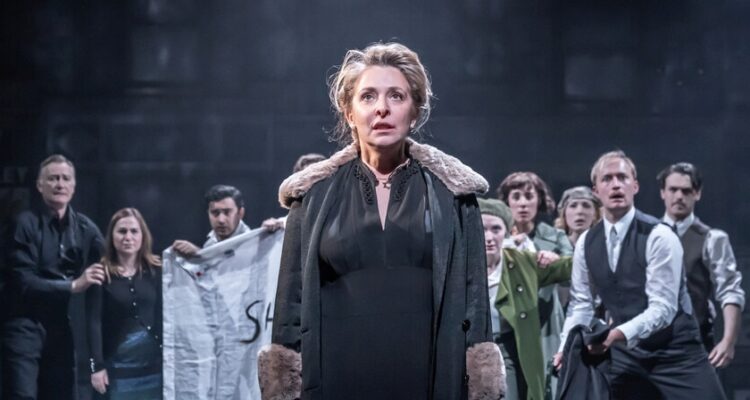The Rialto in Venice, so prominent in Shakespeare’s play, does not feature in this production of The Merchant of Venice, which is set in Cable Street, London, in 1936.
Tracy-Ann Oberman’s bold adaptation of this troubling play is thought-provoking. She offers a new perspective on the main character, Shylock, the Jewish moneylender. Oberman’s Shylock is dignified, determined, and radiates inner strength and confidence throughout the play. Her demand for a pound of flesh is driven by her outraged response to the authorised march by the British Union of Fascists through a Jewish district of the East End of London, including Cable Street. Oswald Mosley’s planned march with his Blackshirt followers, authorised by the then Home Secretary John Simon and under the protection of 5,000 policemen, provides the context for this version of The Merchant of Venice. Shylock’s lines ‘If you prick us, do we not bleed?’ are as much a plea for sanity, tolerance, and shared humanity here as they were in Elizabethan England.

Oberman and the director Brigid Larmour explore the elements in the play that lend themselves to antisemitism. This is not to say that Shakespeare is antisemitic, but the portrait of the main character in this interpretation of the play lends itself to antisemites. The Merchant of Venice was the Nazi propaganda machine’s favourite play. It was staged in Germany over 50 times between 1933 and 1939, stripping the play of any sympathy for Shylock. The Third Reich’s directors revelled in the antisemitic possibilities of the play; after all, the word ‘Jew’ appears in the play more than 50 times, not to mention other derogatory references to him. This latest adaptation of the play skilfully intertwines the two key strands of its narrative: the battle of Cable Street in 1936 and Shakespeare’s divided and complex portrayal of Shylock. The two do not necessarily sit comfortably with each other.
The direction by Larmour offers projected black and white flashing slides of the battle of Cable Street on 4 October 1936. Thousands gathered to block the fascists from crossing Cable Street. They won the day. Our female Shylock is made to be part of that epic encounter.
The overall performance by the cast was accomplished even if Oberman tended to overshadow her fellow actors. Raymond Coulthard’s Antonio is particularly notable. Coulthard presents Antonio as a gentleman, almost nobly restraining his passion and love for Bassiano (Gavin Fowler). Hannah Morrish’s Portia and Gráinne Dromgoole’s Jessica offer recognisable resemblances to their conventional Shakespearean characters.
Set design and costume are beautifully and aptly designed by Liz Cooke.
This fascinating take on The Merchant of Venice well complements the excellent Cable Street Musical.
Until: 23 March 2024
Runtime: 2 hours including an interval
Photo credit: Marc Brenner

